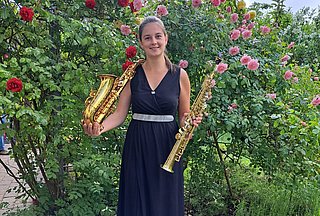Bachelor of Music -
Woodwind Instruments
World-class new and early music.
The woodwinds program can be studied with the main subjects bassoon, clarinet, flute, saxophone and oboe. The artistic and personal team of professors favors ensemble work in all formations, and in the newly founded Wind Academy students make music together with their teachers. The work phases of the university orchestra, projects of the departments of old and new music, choral and opera performances succeed not least because of the excellent performance of our students.
The high number of successful university graduates who have been able to establish themselves professionally after their studies or prize winners of international competitions confirm the high level of systematic pedagogical development work. The resulting attractiveness prompts many highly talented applicants to qualify for a place at our university.
Detailed information about each major can be obtained by contacting the respective major instructor directly.
If you have any questions about the program, please contact the relevant person.
Basic information
| Degree | Bachelor of Music |
|---|---|
| Period of study | 8 Semester |
| Course begin | Wintersemester |
| ECTS points | 240 Credits |
| Major subjects | Fagott, Klarinette, Oboe, Querflöte, Saxophon |
| Continuing study options | Master of Music Wind Instruments, Master of Music Chamber Music, Master of Music Orchestral Playing |
Application and aptitude test
Applications are submitted online via the muvac platform. All information on the procedure can be found on our application page.
Admission requirements
- General university entrance qualification or a comparable university entrance qualification
- Proof of a TestDaF 3 language certificate for non-German-speaking applicants
- Successfully passed aptitude test
Qualifying examination
The aptitude test consists of the following three parts:
- Artistic-practical examination in the main subject (duration approx. 15 minutes)
- Artistic-practical examination in the minor subject piano (duration approx. 10 minutes)
- Music theory (elementary theory of movements/aural training) (written exams, duration together approx. 90 minutes)
Detailed information can be found in the Qualifying Examination Regulations, in particular in the appendix for content requirements and conduct of the examination.
Course of studies and examination regulations
The program is divided into a basic study period (1st and 2nd year) with a high proportion of compulsory modules and a differentiated main study period (3rd and 4th year). The structural framework is formed by 7 main modules and the 8th profile-forming module:
- core module (main subject teaching)
- artistic-practical context (orchestra, chamber music, minor subject)
- education (ear training, music theory, musicology)
- mediation (didactics)
- professionalization (musicianship, etc.)
- Bachelor thesis / interdisciplinary project
- Supplement
- Profile formation, you can choose between the profile Orchestra and the profile Instrumental Pedagogy.
It takes four years to complete your bachelor's degree. Participation in all required courses is certified in the form of credit points, 60 per year, a total of 240 you must achieve. Graded examinations in the core module (major) take place after the second and fourth year of study. The degree includes a Bachelor's thesis, which can be presented in the form of a one-hour concert, for example, taking into account the student's own profile.
Public concerts and weekly auditions of the training classes serve - in addition to participation in the ensembles of the university - to test real performance situations. Supervision in the core module includes weekly lessons and auditions, correpetition, secondary instrument lessons, reed/blade construction (clarinet, saxophone, oboe, bassoon) chamber music and orchestral literature playing (ensemble exercises). In addition, workshops are offered by renowned external musicians, for example for new playing techniques of contemporary music, performance practice of early music, mental training, ensemble-oriented listening, etc..
Teachers
Assistenz Gauthier
Assistenz Wetzel
Barockoboe
Blockflöte
Fagott
Flöte
Klarinette
Klarinette, Fachdidaktik
Korrepetition Bläser
Korrepetition Holzbläser, Schwerp. Klarinette, Klavier
Korrepetition Holzbläser, Schwerpunkt Flöte
Korrepetition Holzbläser, Schwerpunkt Oboe und Fagott
Korrepetition Holzbläser, Schwerpunkt Saxophon
Korrepetition Klarinette und Trompete
Korrepetition Saxophon
Oboe
Piccoloflöte
Querflöte
Querflöte/ Piccolo
Saxophon
Saxophon Ensemble
Traversflöte
Current events
Musikschule Haan, Forum Dieker Carré Haan

Kammermusiksaal Köln

Konzertsaal Köln


Contact

Dean Department 3
|
paul.vanzelm@hfmt-koeln.de |
|
| Address |
Hochschule für Musik und Tanz Köln Unter Krahnenbäumen 87 50668 Köln |



